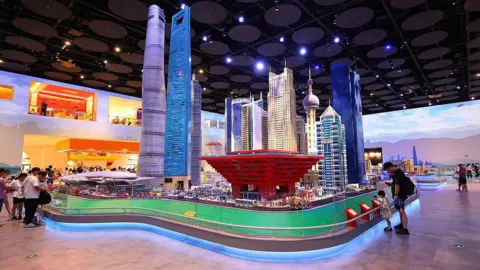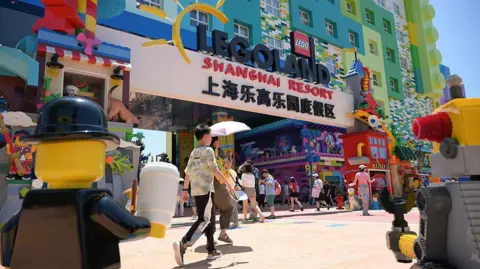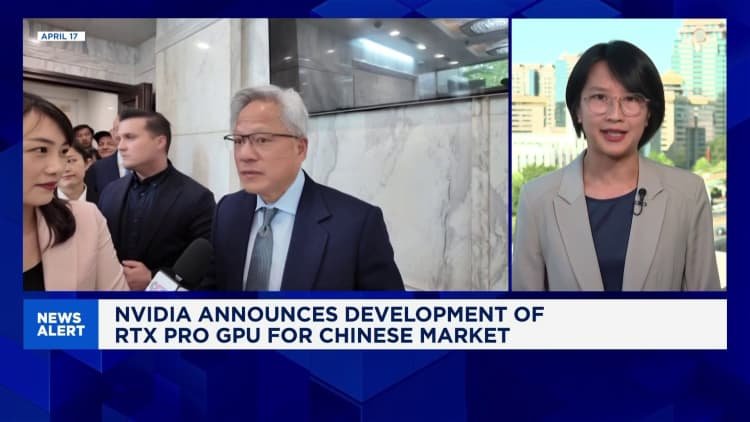Business reporter, BBC News

 Reuters
ReutersTourists flocked to China’s first Legoland theme park as it opened in Shanghai earlier this month, marking another step in the country’s efforts to establish itself as a global travel destination.
It is the latest amusement park to be launched in China by a Western brand. Warner Brothers’ Harry Potter and Hasbro’s Peppa Pig are set to follow.
As consumer spending remains sluggish, Beijing hopes large attractions like this will attract visitors from both China and abroad to help revive the world’s second largest economy.
Theme park developers are being drawn by local government investment but face challenges in a highly competitive market dominated by big names like Disney and Universal Studios.
The $550m (£410m) Legoland Shanghai is the largest park run by the UK-based theme park operator, Merlin Entertainments.
The park is home to 75 rides across eight areas and structures built from millions of plastic bricks, including a miniature version of Shanghai’s skyline.
Hundreds of visitors can be accommodated at its hotel, which has rooms themed around things like pirates and castles.
The park opened after years of collaboration between Merlin, Lego’s parent company and the local government. They are hoping it will attract the famously frugal domestic population as well as foreign visitors.
During a ceremony to mark Legoland Shanghai’s launch, a local authority official called it a much-needed boost to the district’s economy as it will create jobs and support retailers.
State backers have also supported other projects, with a government-controlled building firm owning more than half of Disneyland Shanghai.
Legoland and other branded parks will be keen to capitalise on huge fanbases of children and young people, especially in a market as large as China, said Xiaofeng Zeng, vice president of consumer market research firm Niko Partners.
Despite China’s lacklustre domestic spending, its 1.4 billion people present a huge potential market.
Recent studies have shown that Chinese parents are splurging more on their children, even as overall consumer spending dips, Mr Zeng added.

 Getty Images
Getty ImagesSpending in China may currently be slow, but the country’s focus on boosting local consumption make it attractive to park developers.
Tourism was among the key focuses of China’s latest five-year economic blueprint, which promised more resorts and theme parks.
To encourage investment Chinese authorities are offering tax breaks and other help to finance new attractions, said Nandini Roy, a senior research analyst from Future Market Insights.
For example, the state has backed the Legoland park with new public transport links and major roads.
Authorities also rolled out 570m yuan (£59m; $80m) of subsidies through vouchers and offers as part of a nationwide campaign to spur tourism within the country.
“These measures lower out-of-pocket costs for families and indirectly benefit parks through higher footfall,” said Ms Nandini.
Theme parks help bring in investors and tourists as well as create jobs, said economist Gu Qingyang from the National University of Singapore.
Overseas brands like Lego will also help China to project a more open and international image, he said.

 Getty Images
Getty ImagesBut theme parks like Legoland also face challenges to stand out among the roughly 400 such attractions in China.
Influencer Artem Kapnin, who visited Legoland Shanghai during a preview in June, said it had clearly made efforts to cater to Chinese audiences but lacked the atmosphere of Disneyland.
“I personally love Disneyland more because of the general atmosphere in the park, the characters, and I really enjoy the firework displays,” said Mr Kapnin, a student based there.
Although consumer spending in China remains sluggish, Prof Gu says investors are eyeing this vast nation’s economic prospects many years into the future.
“It’s important to note that building a large-scale theme park often takes close to a decade – so a long-term perspective is essential.”





